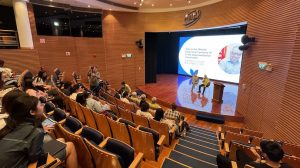Casino operators should pay more attention to the management of sensory experiences inside their properties in order to increase visitor positive emotions and thus boost satisfaction. That is according to a study from an IFT scholar.
“For effective management of visitors’ positive emotions, the operators of casino hotels should pay more attention to the management of sensory experiences and cognitive appraisal of tourism offerings by planning their resource allocation accordingly, improve visitors’ perceived quality, variety and attractiveness of tourism offerings, as well as improve the sensory attributes of casino hotels,” wrote IFT Assistant Professor Dr. Io Man-U in an academic paper published last year.
According to Dr. Io’s study, visitors’ sensory experiences include factors such as smell, aesthetics and sound. Cognitive appraisal of casino hotels refers to perceived attractiveness, quality and variety of tourism offerings – including facilities and available activities.
Her work, “Understanding the effects of multi-dimensional tourism experiences on tourists’ positive emotions and satisfaction in the context of casino hotels”, was featured in the International Journal of Culture, Tourism and Hospitality Research.
Dr. Io’s results pointed that the respective impact of preference for gaming or non-gaming activities on visitors’ positive emotions was “limited”, she wrote. “Other dimensions such as sensory experiences actually had stronger impacts on visitors’ positive emotions,” she added. Dr. Io suggested this meant casino-hotel operators “should not only take the effects of [gaming and non-gaming] activities on positive emotions into account, but also the effects of other dimensions of tourism experiences on visitors’ positive emotions all together.”
Positive emotions
The research conclusions were based on a quantitative survey: a specially-prepared questionnaire was answered by 500 ethnic Chinese tourists to Macao, at 4 of the city’s largest casino hotels: City of Dreams Macau, Venetian Macao, Galaxy Macau and MGM Macau.
The respondents were either from Mainland China, Hong Kong or Chinese Taiwan. Data collection took place over several weekends in June 2014.
The study focused on 4 dimensions of tourism experiences: respondents’ preference of gaming and non-gaming activities; sensory experiences; social relations; and cognitive appraisal of tourism offerings including tourism activities and related facilities in casino hotels.
“Different dimensions of tourism experiences were found to have different levels of impact on respondents’ positive emotions,” noted Dr. Io in her paper. “Positive emotions play an important role in tourists’ satisfaction and behavioural intention,” she added.
Dr. Io pointed that social relations, in particular, “were not found to determine tourists’ positive emotions significantly in the context of casino hotels”, opposite to what was suggested by previous studies. “Since this present study only focused on Chinese tourists and casino hotels, similar test in other casino hotels and tourists with different geographical and cultural backgrounds may result in different findings,” she noted.
Dr. Io said her results showed casino-hotel operators should “encourage visitors to participate in both gaming and non-gaming… activities to enrich their positive emotions and experiences”. The IFT scholar added that “the management of sensory experiences should not only focus on aesthetic design and settings but also other elements of sensory experiences, such as scenes, noise control, public facilities and smell of fragrance.”
As for effective management of visitors’ cognitive appraisal of tourism offerings, “the operators of casino hotels should keep improving visitors’ perceived quality, variety and attractiveness” of activities and facilities at their respective properties, in order to generate positive emotions, Dr. Io wrote.
More info
Her research interests include tourist experience and behaviour in the areas of heritage tourism, casino hotels, and nostalgia tourism.
Dr. Io currently teaches hospitality and marketing subjects. In addition, she is a UNESCO Cultural Heritage Specialist Guide trainer at IFT. She worked in the hotel industry before joining the Institute; Dr. Io now serves on several academic and tourism industry-related committees in Macao.
https://doi.org/10.1108/IJCTHR-05-2016-0050









